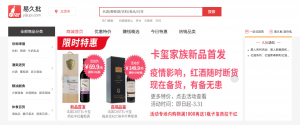Last month, Yijiupi, a company hardly known outside of China, made an acquisition that could change an industry worth billions of dollars. The procurement platform, used by over 800,000 brick-and-mortar businesses to buy products for resale, acquired ZShuaixiao, a smaller competitor in the fast-moving consumer goods (FMCG) market with a strong presence in southern China.
The deal, financial details of which are undisclosed, is a step towards consolidation in China’s highly fragmented online procurement industry, where dozens of startups compete with big players like JD.com and Alibaba, as well as traditional suppliers, to give storefronts goods at the lowest prices.
Started by Wang Chaocheng and Cheng Shengqiang, the company, which initially specialized in liquor, saw rapid growth by undercutting middlemen resellers, who—between manufacturers and low-level salesman—can pass a significant markup on a premium bottle of liquor to the store on the street. From 2016, the firm has expanded to offer a wide range of FMCGs goods, growing its presence in the market.
“By 2018, about 70% of all mom-and-pop stores had procured online, and the frequency and amount of online procurement have been growing,” said, Cao Yi, founding partner of Source Code Capital, which is among Yijiupi’s investors. “Online procurement is an irreversible trend and the FMCG market is huge. We firmly believe that in this wave, a national, all-brand, multi-channel supply chain giant will come into being.”

With the acquisition of ZShuaixiao, Yijiupi seeks a dominant role in the FMCG market by expanding its product offering and gaining a stronger foothold in Fujian and Guangdong, said Yijiupi’s co-founder Cheng Shengqiang. The firm also recently completed an undisclosed Series D4 round of financing, with investments from DragonBall Capital, GLP, and Source Code Capital.
Major Chinese tech firms like Tencent and Meituan Dianping were also part of the company’s USD 200 million Series D completed in September 2018, raising its valuation above USD 1 billion the same year.
In 2019, Yijiupi hit RMB 20 billion yuan (USD 2.87 billion) in gross merchandise volume (GMV), and expanded its services to over 800,000 users across 138 cities, including large supermarkets and restaurants. By comparison, Huimin, another procurement startup, had 600,000 stores in 2018, while Best Store+ had 430,000 users by the end of September of 2019.
Yijiupi’s growth has put the company in the position to challenge other big players in the storefront supply market such as Alibaba’s Lingshoutong, which serves over 1 million physical stores in China.
However, by pursuing major growth outside of liquor sales, Yijiupi also walks a thin line: In trying to do more, the procurement platform risks losing its edge by becoming master of none. Its acquisition of ZShuaixiao, along with the new funding, will prove crucial in overcoming this challenge.
Zhang Hui, who operates four grocery stores in Beijing, started using Yijiupi in 2017 when he noticed their low prices for bottled water. As a store owner, he has become adept at wedging margins when he sees them. Indeed, storefronts’ notoriously low margins are a characteristic that makes it difficult for a massive, consolidated platform to exist—highly savvy buyers are willing to change platforms if they see a better deal.
“Each one has its merits and demerits, and all are useful,” Zhang told KrASIA.
Yijiupi is best for liquor, he said, while Huimin has a wider selection of goods and gives great loans (he got RMB 400,000 at no interest to be used with the company.) Best Store+ offers a reliable logistics service, while Zhangguibao offers affordable electronics directly from manufacturers. Lingshoutong is the to-go destination for rare and low-volume products, he added.
Besides deals and lower prices—which are sometimes only marginally better than traditional suppliers—these new procurement platforms offer another key advantage. Their knowledge and closer cooperation with manufacturers within their areas of specialization, along with the traceability of e-commerce transactions, makes them less likely to offer fakes products when compared to traditional brick-and-mortar distributors, according to Zhang.
While the coronavirus outbreak has been disrupting businesses in China, the acquisition of ZShuaixiao—which had 100,000 clients in Guangdong and Fujian provinces before the deal—puts Yijiupi in a prime position to reap the rewards once the country’s economic engine resumes moving at full speed, said one analyst.
“The acquisition of ZShuaixiao will strengthen Yijiupi’s position in the market, giving the company better capability to weather the coronavirus crisis than smaller competitors,” Wu Di told KrASIA. “When the Covid-19 crisis is finally over, the FMCG sector will witness a tremendous rebound and B2B e-commerce players, as the B2C consumer sector’s upstream players, will benefit.”
